In Malaysia, motorcycles are more than just a means of transport. They are a lifeline for millions.
From students and workers to delivery riders, two wheelers offer a faster, more economical way to navigate the dense traffic of cities like Kuala Lumpur and its surrounding suburbs.
With fuel efficiency and affordability, motorcycles have become the preferred mode of transport for many, with motorcycles making up at least nearly 17 million registrations, out of half of the country’s total of 38 million vehicles.1 But this convenience comes with a cost.
Motorcycles account for a majority of road related accidents, injuries and deaths, with official statistics noting that nearly 70% of the people who on Malaysia’s roads every year are motorcyclists.2
Many of these injuries and deaths are actually preventable. The Malaysian Institute of Road Safety Research (MIROS) has consistently pointed out that many of these mishaps could have been prevented th rough proactive measures in training, education, and behavioural change.
At Tenaga Nasional Berhad (TNB), this issue strikes close to home. Over 6,000 of our employees rely on motorcycles as their daily mode of transport. For us, road safety is not just a national issue - it is a personal one. Every time an employee is involved in a road incident, it is more than just a statistic. It affects lives, families, and the wellbeing of our workforce.
Motorcycle related accidents represent one of the most significant commuting risks for our employees , leading to lost man hours, work disruptions, and most importantly importantly, physical and emotional suffering.
In response, TNB launched the Reinforcing Safety for TNB Riders (RSFTR) programme, an initiative that not only seeks to reduce these risks, but also introduce safer practices and responsible commuting into our company culture.
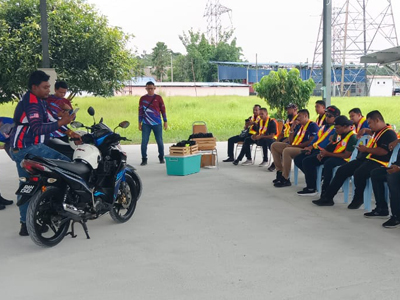
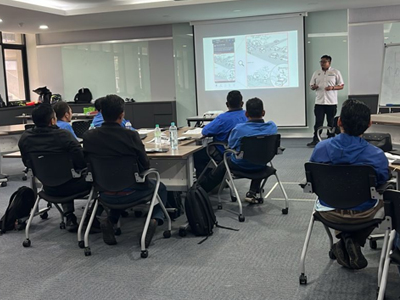
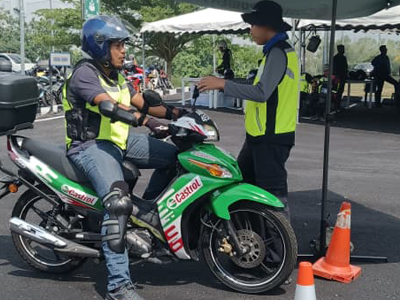
Building A Culture Of Safety For Our Motorcycle Riders
For any safety programme to become embedded in an organisation’s culture, it must go beyond one-off training sessions or brochures. True impact is achieved through education, engagement, and empowerment - the three pillars on which the RSFTR initiative was built.
We view RSFTR not merely as a safety programme, but as a structured movement - one that equips our motorcycle riding employees with the knowledge, tools, and confidence to ride safely and responsibly on Malaysia Malaysia’s roads.
To ensure long term success, RSFTR was designed in alignment with TNB’s broader Environmental, Social and Governance (ESG) goals - particularly our commitment to protecting lives, promoting responsible commuting, and supporting the well being of our workforce.
The programme was designed around three core modules:
Theory Session
A refresher course covering essential road laws and riding regulations, tailored to local commuting realities.
Defensive Riding Techniques
Practical, hands on training designed to improve situational awareness, hazard anticipation, and safe response to real world traffic scenarios.
Motorcycle Maintenance
A practical segment teaching participants how to carry out critical safety checks to ensure their motorcycles remain roadworthy.
To deliver these modules effectively, TNB mobilised a team of 32 certified motorcycle safety trainers from TNB Kilat Bikers (internal community within TNB composed of passionate motorcycle riding staff members), working in collaboration with TNB Integrated Learning Solutions Sdn Bhd (ILSAS) as the training provider.
This strategic move in human capital reflects TNB’s commitment to building internal expertise and fostering a culture of safety. By deploying these certified trainers across divisions and subsidiaries, the RSFTR programme has reached over 700 employees and continues to grow - ensuring consistent, high quality training and reinforcing our ESG promise to protect lives and drive continuous improvement in road safety practices.
To embed this initiative more deeply within our organisational framework, the RSFTR course is now formally integrated into the employees’ learning journey. This institutionalisation ensures that road safety awareness becomes a sustained part of our employee development process, rather than a one off intervention.
The programme is further championed by our Health, Safety and Environment (HSE) Committee, comprising senior management from across departments. This body plays a key role in shaping TNB’s strategic direction on safety and environmental issues, reinforcing the importance of safe commuting as a shared organisational value.
To measure the programme’s impact, a follow up training evaluation was conducted with results based on participants feedback showing that trainers trainers’ delivery and expertise were rated at 87%, while the effectiveness of the training content scored 93%. These ratings affirm the strength of TNB TNB’s in house trainers and that the training module itself is highly effective in meeting participants’ need.
Many participants reported successfully applying these skills to prevent accidents and actively sharing safety tips with peers. While these outcomes reflect a positive behavioural shift, participants also highlighted ongoing challenges such as poor road infrastructure, the presence of reckless drivers, and personal constraints like time pressures and sustaining discipline.
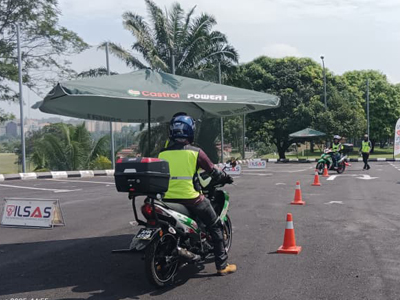
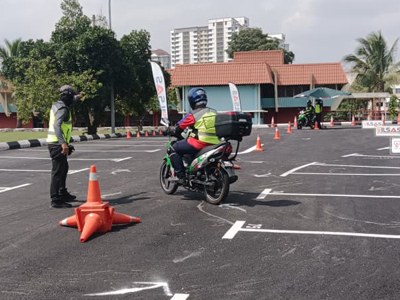
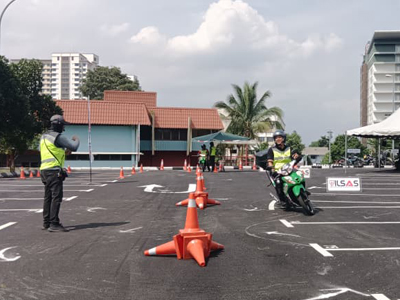
Driving Early Change, Paving The Road Ahead
Thus far, the programme has been a resounding success, with early results showing improved safety awareness and a reduction in minor incidents.
While a more comprehensive assessment is expected by year end, the momentum is clear departments and divisions across TNB are showing strong interest in adopting the initiative for their teams.
Employees have also responded well, with many expressing greater confidence and appreciation for the initiative. Looking ahead, TNB remains committed to expanding the RSFTR programme, with plans underway to increase its engagement across the company.
By placing road safety at the heart of our operations, measures like these not only protect employee wellbeing but also strengthens our overall ESG goals.
By investing in the safety of our riders, TNB affirms its long term commitment to ensure that while we power the nation, we can also protect those who keep it running.
Source:
- NST Leader: Death by roads. New Straits Times (2023, December 6). .
- Miros: 12 Motorcyclists Die On Roads Daily. New Straits Times (2025, July 22).






